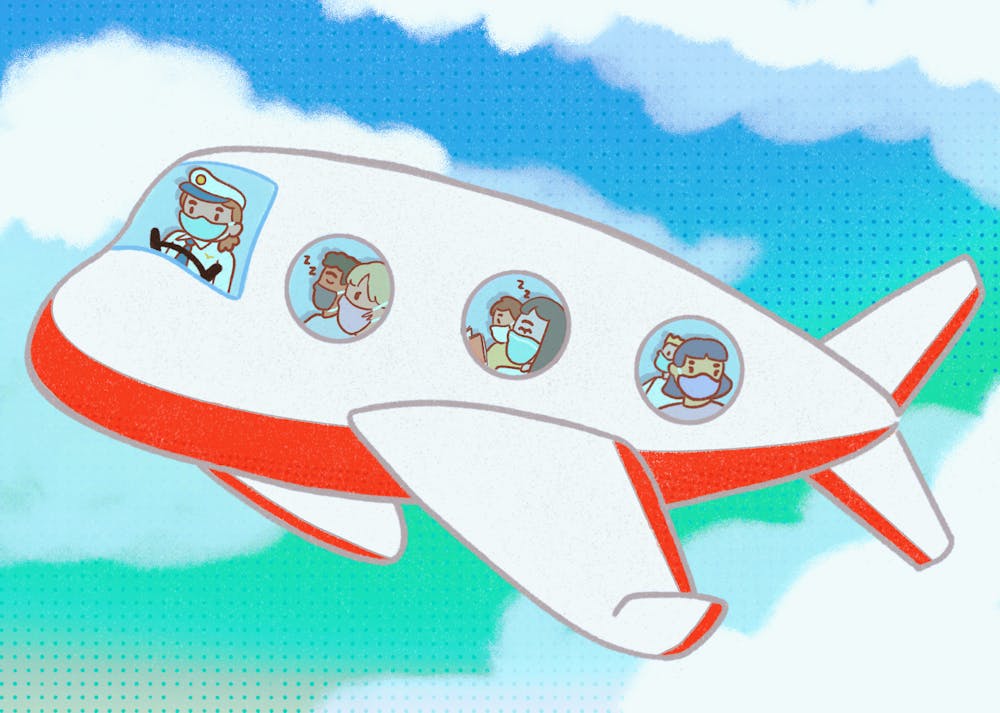With the semester coming to a close, University officials and health experts are encouraging students to get tested for COVID-19 before traveling for winter break — while continuing to follow good health practices when away from campus.
COVID-19 cases are surging across the nation, including within Arizona and the ASU community. And with two major holidays nearing, health experts are worried the pandemic will worsen.
Keri Althoff, associate professor in the department of epidemiology at the Johns Hopkins Bloomberg School of Public Health said at a briefing last week "staying at home is the lowest risk" for celebrations this year.
"The celebration may be just one single event, but it's actually the 14 days before. You're bringing all of those exposures with you," Althoff said. Isolation, testing and minimizing exposure should begin as soon as possible, she said.
University officials are encouraging students and employees to take advantage of Biodesign Institute's free saliva-based COVID-19 test. Results are often received within 24-48 hours.
"We encourage everyone to follow public health recommendations related to family gatherings — minimize attendance and move holiday celebrations outside if possible — and make a testing plan to ensure you aren't unknowingly spreading the virus," wrote University spokesperson Katie Paquet in an email.
Amesh Adalja, senior scholar at Johns Hopkins' Center for Health Security at the Bloomberg School of Public Health, said "the number one thing that needs to be understood is your risk tolerance."
Risk tolerance, Adalja said, is an individual assessment of an event where people and family members will be: Are there people in attendance with high risk for infection? Is everyone on the same page about mask, testing and contact tracing procedures? Will there be people at the event outside of a quarantine bubble?
Adalja said required exit testing of college students before they return to a community they have not visited since August would be ideal. Schools like Vanderbilt University and the State University of New York are requiring students to be tested before going home for Thanksgiving. Texas A&M University, like ASU, is encouraging students to be tested before returning home for winter break.
Despite said encouragement from ASU, there has yet to be an explicit recommendation to isolate before traveling. In a Monday video announcement from University President Michael Crow, he reemphasized the Community of Care and again said students should get tested to protect themselves and their families.
"Coming home for the most part should be thought of as a high-risk contact," Adalja said. "Americans haven't had to make these kinds of risk calculations for a long time. Knowing that there is some risk and that there are some common-sense precautions you can do will make it a little bit safer."
READ MORE: ASU professors warn risks of superspreader events in upcoming holiday season
Everyone should be looking to celebrate the holidays with only their immediate family, said Joshua LaBaer, executive director of the Biodesign Institute, at a media briefing on Nov. 11.
"This is not the best year for a big family to get together," LaBaer said. "This is a better year to kind of hang out with your immediate family who you're around all the time."
If students do return home for the holidays, it is best to travel by car if possible. He said if you are traveling by plane, "sit away from everybody else for as long as you can" at the airport and never take your mask off there or on the plane.
Althoff said recent studies from the Department of Defense and United Airlines suggested contracting COVID-19 on an airline is not particularly high, but the process of getting onto an airplane and moving through an airport during the holidays can be risky.
Adalja said any in-person gathering with restrictions will not eliminate risk entirely and precautions can only help to a certain extent. Travel is becoming more restrictive, he said, and travelers should be wary of what that means.
Multiple states, such as Massachusetts, New Jersey, New Mexico and New York, require travelers to quarantine for 14 days upon arrival. New York and other states provide travelers the option to submit a recent negative test upon arrival to avoid the quarantine period. Some essential workers are exempt from this requirement.
At a Wednesday briefing, Gov. Doug Ducey announced airports in Phoenix, Mesa and Tucson would soon have voluntary testing sites where travelers could get tested for COVID-19. The Arizona Department of Health Services also released guidelines Wednesday for "safer holiday gatherings," which includes celebrating outside and avoiding buffets.
Althoff and Adalja said getting a flu vaccine could help mitigate the spread and keep hospitals open for COVID patients. Althoff said virtual gatherings, outside interactions or indoor interactions where each participant brings their own food, should be considered as alternatives to traditional Thanksgiving and gatherings.
Reach the reporters at pjhanse1@asu.edu and wmyskow@asu.edu and follow @piperjhansen and @wmyskow on Twitter.
Like The State Press on Facebook and follow @statepress on Twitter.

Wyatt Myskow is the project manager at The State Press, where he oversees enterprise stories for the publication. He also works at The Arizona Republic, where he covers the cities of Peoria and Surprise.

Piper Hansen is the digital editor-in-chief at The State Press, overseeing all digital content. Joining SP in Spring 2020, she has covered student government, housing and COVID-19. She has previously written about state politics for The Arizona Republic and the Arizona Capitol Times and covers social justice for Cronkite News.




